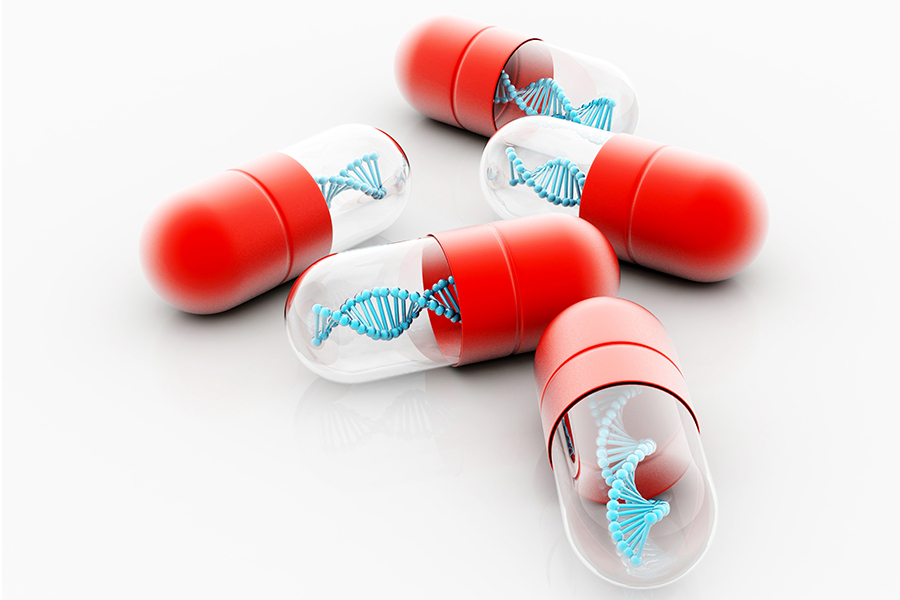New FDA Designations May Jumpstart Gene Therapy Development
October 18, 2024
The U.S. Food and Drug Administration (FDA) has granted NCATS both Rare Pediatric Disease (RPD) designations and Orphan Drug Designations (ODDs) for five investigational gene therapies. The therapies are for rare diseases studied by the Accelerating Medicines Partnership® (AMP®) Bespoke Gene Therapy Consortium (BGTC). These designations are key to the BGTC’s mission to streamline the development of bespoke gene therapies for extremely rare diseases of no commercial interest.
The FDA grants an RPD designation when preclinical data for an experimental drug or therapy suggest the treatment could be effective in treating a rare disease that primarily affects children. Similarly, the FDA grants an ODD for an investigational treatment when preclinical data show a possible benefit for people with a rare disease. Both designations can open a door to financial incentives for prospective partners to further develop the therapies for rare diseases and bring them to market.
NCATS is the sponsor for these five therapies:
- Adeno-associated virus 9 (AAV9-hPCCB) for propionic acidemia. This metabolic disease in newborns results in a lack of muscle tone, poor feeding, vomiting, listlessness, dehydration and seizures.
- Adeno-associated virus 9 (AAV9-SUMF1) for multiple sulfatase deficiency. This inherited, progressive brain disorder has symptoms ranging from seizures and loss of developmental skills to skeletal and skin abnormalities.
- Adeno-associated virus nephrocystin 5 (AAV-NPHP5) for NPHPR mutation-associated retinal dystrophy. This degenerative eye disease affects the retina and can cause vision loss and even blindness.
- Adeno-associated virus 5 (AAV5-CNGB1) for autosomal recessive retinitis pigmentosa due to CNGB1 mutation. This inherited eye disease affects the retina, leading to impaired vision and possibly blindness.
- Adeno-associated virus 8 (AAV8-hGALNS) for mucopolysaccharidosis IVA (Morquio A syndrome). This inherited, progressive disease often results in short stature, abnormal spine development, and heart and vision problems.
An RPD designation and an ODD also were granted for a sixth program within the BGTC for adeno-associated virus 8 (AAV8-hSLC4A11) for congenital hereditary endothelial dystrophy. The sponsor of this program is Anthony Aldave, M.D., at the University of California, Los Angeles. This genetic eye disorder affects the cornea, leading to vision problems. The project is funded by a grant from the California Institute for Regenerative Medicine.
The BGTC clinical programs’ therapies, which are still in preclinical development, aim to test the safety and preliminary effectiveness of gene therapies for eight rare diseases. Each treatment is being tested in small numbers of people. If successful, such early phase trials will set the stage for pivotal studies.
The RPD designation is key to getting a Priority Review Voucher (PRV). A company that receives an approval for a drug for a rare pediatric disease can use the PRV to speed the FDA review process for another product. The voucher also might offer the company a competitive advantage. The PRV program currently is scheduled to sunset on Dec. 20, 2024.
Incentives from the ODD include an exemption from the user fee for the FDA New Drug Application or the Biologics License Application. This fee can be millions of dollars. Companies can get tax credits for successful clinical trials with their drug products. ODD recipients also get seven years to exclusively market an approved drug.
“Making gene therapies for rare diseases more attractive to potential commercial sponsors is one of the ultimate goals of the BGTC projects,” said Dominique Pichard, M.D., director of the NCATS Division of Rare Diseases Research Innovation.
Scientists estimate that there are more than 10,000 rare diseases. Most are caused by single gene defects. Gene therapy replaces a malfunctioning, disease-causing gene with a functioning gene. This makes gene therapy a possible treatment option for many rare, genetic diseases. But most rare diseases only affect a few hundred to a few thousand people. This can make it hard for companies to invest the resources needed to develop and bring a gene therapy for a rare disease to market.
Several key challenges remain, such as gene delivery, manufacturing and cost.
“Getting these designations increases the chance that the successful therapies will be picked up by a company and commercialized,” explained NCATS Director Joni Rutter, Ph.D.
“All of us who work in rare diseases have experienced the frustration of trying to advance a therapy forward,” said Rebecca Ahrens-Nicklas, M.D., Ph.D., at Children’s Hospital of Philadelphia. Ahrens-Nicklas is a lead scientist for the BGTC gene therapy project focused on multiple sulfatase deficiency.
“The economic incentives aren’t there for commercial partners. These designations are important to help push rare disease research forward so our patients aren’t left behind.” To Rutter, the emphasis has always been on the patient. “NCATS’ role in helping lead the BGTC and sponsoring the FDA applications for these designations underscore our commitment to accelerating the development of potentially life-saving therapies for people with rare diseases.”
BGTC groups helped draft and obtain the FDA designations.
“This would not have been possible without the steadfast and incredible work completed by the disease-specific teams,” said Iwona Jeske DuPont, Ph.D., Vice President Anti-Infectives, Internal Medicine & Global Brands – Regulatory at Pfizer. “The teams’ diligent and rapid work allowed for these diseases to earn RPD designations, further stimulating the BGTC program for future successes.”
The BGTC is a public-private partnership among NIH, the FDA, pharmaceutical and life science companies and patient advocacy groups. NCATS helps coordinate and lead the BGTC. NCATS is among 10 participating NIH Institutes and Centers. The Foundation for the National Institutes of Health (FNIH) manages the BGTC as part of its AMP® program.
The BGTC is one of many AMP® programs expediting discovery around Alzheimer’s disease, Parkinson’s disease, amyotrophic lateral sclerosis (ALS), schizophrenia, rheumatoid arthritis and lupus, type II diabetes, common metabolic diseases, heart failure, and autoimmune and immune-mediated diseases. FNIH has managed these programs since the 2014 launch of the large-scale initiative. To learn more about AMP®, visit fnih.org/AMP.
The Accelerating Medicines Partnership and AMP are registered service marks of the U.S. Department of Health and Human Services.



